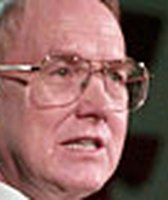Stand up for the facts!
Our only agenda is to publish the truth so you can be an informed participant in democracy.
We need your help.
I would like to contribute
SUMMARY: Sen. Hillary Clinton says she should stay in the race because nomination contests in previous years have lasted until June. But we find her analogies to 1992 and 1968 don't hold up.
Sen. Hillary Clinton has had to answer questions about why she's staying in the race for the Democratic nomination for president when Sen. Barack Obama has an insurmountable lead.
Clinton has made a number of arguments about why she should stay in. One of her arguments is that history shows nomination races can take a long time.
"My husband did not wrap up the nomination in 1992 until he won the California primary somewhere in the middle of June, right? We all remember Bobby Kennedy was assassinated in June in California. I don't understand it," she told the editorial board of the Argus Leader, the newspaper that serves Sioux Falls, S.D.
Her remarks ignited a small furor because some people thought she was implying in a not-so-subtle manner that Obama might be assassinated. The Clinton campaign strongly disputed that interpretation, and Clinton herself apologized for her remarks.
Sign up for PolitiFact texts
The video of her appearance before the editorial board shows that she emphasizes the words "in June" when discussing Kennedy. The context shows Clinton making an argument she's made before, that it's not so unusual for nomination races to take a long time.
We looked into the history of these two races, though, and found that there are important differences between those years and 2008.
In 1992, Bill Clinton lost a few early contests to former Massachusetts Sen. Paul Tsongas and former California Gov. Jerry Brown. But he came back and swept the Southern states on Super Tuesday — March 10 compared to Feb. 5 this year — then took Michigan and Illinois on March 17 for a decisive victory.
The late March primaries left him with 942 delegates, a commanding lead with more than twice the number of his closest opponent, Tsongas, who suspended his campaign that week.
Hillary Clinton is technically right that it wasn't until the June 2 primaries in Ohio, New Jersey, Alabama, California, Montana and New Mexico that Bill Clinton clinched the nomination. Before the night was out, he had surpassed the 2,145 delegates needed. But after March, there was little doubt that he would become the nominee.
Clinton cited the 1992 race in an interview March 24, 2008, with the Philadelphia Daily News editorial board. We ruled her statement Barely True .
Her analogy to the 1968 race doesn't hold up much better.
For one thing, the 1968 race started much later than the 2008 race, in terms of both when candidates declared to run and the primary calendar.
In 1968, incumbent President Lyndon Johnson was widely expected to seek another term. But dissatisfaction with the Vietnam War prompted talk of a challenger. Kennedy's friends urged him to run, but Sen. Eugene McCarthy of Minnesota entered the race first. McCarthy exceeded expectations dramatically when he took 41.9 percent of the vote in the New Hampshire primary on March 12, 1968, compared with Johnson's 49.6 percent.
With Johnson's vulnerability revealed, Kennedy entered the race. Johnson then surprised everyone by withdrawing on March 31.
The race between Kennedy and McCarthy was tumultuous. Kennedy seemed to be outpacing McCarthy, but lost to him in Oregon on May 28. The California primary, set for June 4, was widely seen as a crucial turning point. Kennedy won the primary, but was assassinated shortly after midnight on June 5 by Sirhan Sirhan. Ultimately, Johnson's vice president, Hubert Humphrey, secured the nomination at a chaotic convention in Chicago that August, and then lost to Republican Richard Nixon.
So, the chronology of the 1968 race has some important distinctions from 2008. The 1968 race didn't start in earnest until the middle of March. One might even argue that it didn't begin until the very end of March, after the sitting president announced that he wouldn't seek re-election.
Compare that to this cycle, when the field of candidates was largely settled nearly a year before the first primary vote in January 2008. Clinton and Obama were declared candidates for their party's nomination in early 2007 with no national figure around to cloud the picture.
Also, the 1968 New Hampshire primary, the first significant vote of the year, was March 12. In 2008, New Hampshire had its primary on Jan. 8, and Iowa held its crucial election five days before that. If you calculate days between the New Hampshire primary and June 3 of each year, the distance was 81 days in 1968, but 141 days in 2008.
So Clinton is right that the 1968 contest was still going on in June of that year, and it was still competitive. But she ignores important facts that make her comparison between that election year and this one inaccurate. We are not evaluating the question of whether Clinton should drop out of the race, but we find her historical argument that there's nothing unusual about a Democratic primary still being contested in June to be technically accurate but completely misleading. We rate this claim, like the last one, Barely True.
A better example of an extended nominating process is arguably 1988, when Michael Dukakis, former governor of Massachusetts, won the Democratic nomination. The New Hampshire primary was Feb. 16, Dukakis was considered the likely winner by May, and he secured the nomination in June. That year, Jesse Jackson was the challenger who refused to drop out, citing the need to represent progressive social policies at the convention. Dukakis went on to lose to George Bush in the general election.
That example doesn't bode well for Democrats, though, a likely reason Clinton hasn't mentioned it.




























